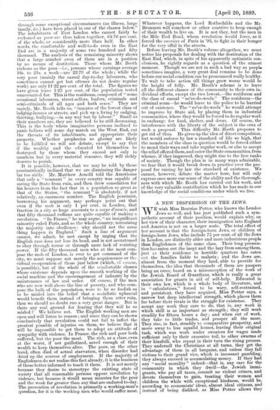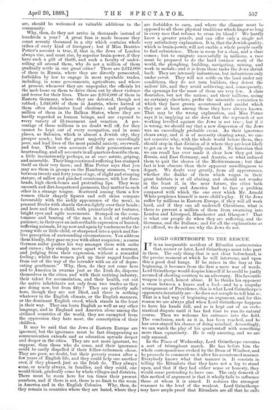A NEW DISPERSION OF THE JEWS.
WE wish Miss Beatrice Potter, who knows the London Jews so well, and has just published such a sym- pathetic account of their position, would explain why, on her view of their character, their immigration into England and America is not on a larger scale. The total effect of her account is that the foreign-born Jews, or children of foreign-born Jews, who include 75 per cent. of all the Jews in London, are distinctly abler and more industrious people than Englishmen of the same class. Their long persecu- tion has eaten out the inept and the lazy from among them, just as their residence in horrible quarters has eaten out the families liable to malaria ; and the Jews are, almost from the moment they land, able to provide for themselves, the idea that thousands of them are paupers being an error, based on a misconception of the work of the Jewish Board of Guardians, which is really a great association for grants in aid of self-help. Educated, in their own law, which is a whole body of literature, and in "calculations," forced to be wary, self-restrained, and persistent, they have acquired, Miss Potter says, a narrow but deep intellectual strength, which places them far before their rivals in the struggle for existence. They accept any work they care to do, that is, any work in which skill is as important as strength ; they will work steadily for fifteen hours a day ; and when out of work, they take to little trades, and prosper all the more. They rise, in fact, steadily to comparative prosperity, and move away to less squalid homes, leaving their original task, which was work under sweaters for wages made sufficient only by their excessive toil, to other swarms of their kinsfolk, who repeat in their turn the rising process. They undersell the Christians at all turns, they get the advantage of them in all bargains, and unless they fall victims to their grand vice, which is incessant gambling, they always succeed in accumulating money. If they had any "social morality" indeed—that is, any care for the community in which they dwell—the Jewish immi- grants, who pay all taxes, commit no violent crimes, and devote themselves to gain, treating their women and children the while with exceptional kindness, would be, according to economists' ideas, almost ideal citizens, and instead of being disliked, as Miss Potter allows they are, should be welcomed as valuable additions to the community.
Why, then, do they not arrive in thousands instead of hundreds a year ? A great fuss is made because they count seventy thousand in a city which contains whole tribes of every kind of foreigner ; but if Miss Beatrice Potter's account is true, if, that is, the Jews of London always rise, and must rise, by superior brain-power, if they have such a gift of thrift, and such a faculty of under- selling all around them, why do not a million of them gradually settle in our great cities ? There are 2,612,000 of them in Russia, where they are directly persecuted, forbidden by law to engage in most reputable trades, including, in some governments, agriculture, and where at present, whenever they are unpopular, the officials let the mob loose on them to drive them out by sheer violence and terror for their lives. There are 2,954,000 of them in Eastern Germany, where they are detested, though not robbed ; 1,648,000 of them in Austria, where hatred of them often dominates local elections ; and perhaps a million of them in the Balkan States, where they are hardly regarded as human beings, and are exposed to every variety of ill-treatment and vexation. A per- centage of these millions is no doubt well off, for they cannot be kept out of every occupation, and in some places, as Salonica, which is almost a Jewish city, they prosper much ; but the great majority are exceedingly poor, and lead lives of the most painful anxiety, overwork, and fear. Their own accounts of their persecutions are heartrending, and all accounts in all quarters describe them, a little inconsistently perhaps, as at once astute, griping, and miserable. Their long-continued suffering has stamped itself on their very faces ; and Miss Potter says that you may see them in groups on the Hamburg steamers, "men between twenty and forty years of age, of slight and stooping stature, of sallow and pinched countenance, with low fore- heads, high cheek-bones and protruding lips. They wear uncouth and dirt-bespattered garments, they mutter to each other in a strange tongue. Scattered among them a few women (their shapely figures and soft skins compare favourably with the sickly appearance of the men), in peasant frocks with shawls thrown lightly over their heads ; and here and there a child, with prematurely set features, bright eyes and agile movements. Stamped on the coun- tenance and bearing of the men is a look of stubborn patience; in their eyes an indescribable expression of hunted, suffering animals, lit up now and again by tenderness for the young wife or little child, or sharpened into a quick and fur- tive perception of surrounding circumstances. You address them kindly, they gaze on you with silent suspicion ; a coarse German sailor pushes his way amongst them with oaths and curses ; they simply move apart without a murmur, and judging from their expression, without a resentful feeling ; whilst the women pick up their ragged bundles from out of the way of the intruder with an air of depre- cating gentleness." Why, then, do they not come here and to America in swarms just as the Irish do, disperse themselves in the cities, and with their untiring industry, their talent for accumulation, and their health, cut out the native inhabitants not only from two trades as they are doing now, but from fifty ? They are perfectly safe here, though they are not liked, and there is nothing whatever in the English climate, or the English manners, or the dominant English creed, which stands in the least in their way. They can learn English as well as any other language, and in England and America alone among the civilised countries of the world, they are exempted from the oppression they hate most, the conscription of their children.
It may be said that the Jews of Eastern Europe are ignorant, but the ignorance must be fast disappearing as communication extends and as education spreads deeper and deeper in the cities. They are not more ignorant, we suppose, than those who do come, and their ignorance could be easily dispelled if their fellow-tribesmen chose.
They are poor, no doubt, but their poverty ceases after a few years of English life, and they could help one another over, if they pleased, just as the Irish do. They always some, or nearly always, in families, and they could, one would think, gradually come by whole villages and districts. There must be room here for ten times their present numbers, and if there is not, there is no limit to the room in America and in the English Colonies. Why, then, do they remain in countries where they are bated, where they are forbidden to earn, and where the climate must be opposed to all those physical traditions which linger so long in every race that refuses to cross its blood ? We hardly know a greater puzzle, and can offer only a single not very satisfactory explanation. It is, that the Jewish quality, which is brain-power, will not enable a whole people easily to find subsistence. There is room for a, class, and a class comes ; but to emigrate successfully in millions, a race must be prepared to do the hard outdoor work of the world, the ploughing, building, navigating, mining, and work in metals ; and it is from these tasks the Jews shrink back. They are intensely industrious, but industrious only under cover. They will not settle on the land under any conditions, they do not turn builders, they detest the sailors' life, and they avoid soldiering, and, consequently, the openings for the mass of them are very few. A class flourishes, but not the nation ; and their millions, seeing no certainty elsewhere, prefer the miserable certainties to which they have grown accustomed and amidst which they are at least among those they have always known. That may be the wrong explanation, and Miss Potter says it is, implying as she does that the reproach of not working levelled against the Jews is not true ; but if it is wrong, we should say that a new dispersion of the Jews was an exceedingly probable event. As their ignorance clears away, and it is of necessity clearing away, we can- not conceive why, with the whole world before them, they should stop in that division of it where they are least likely to get on or to be tranquilly endured. No historian that we can recall has ever made it clear how they got into Russia, and East Germany, and Austria, or what induced them to quit the shores of the Mediterranean ; but that fact is less obscure than their apparent unwillingness to depart. We doubt very greatly, from all appearances, whether the dislike of them which reigns in their great habitats is at all abating, and should not wonder in the least if, in the near future, the cities both of this country and America had to face a problem compared with which the one over which Mr. Arnold White perplexes himself is mere child's-play. If the Jews suffer by millions in Eastern Europe, if they will all work hard, and if they can all undersell Christians, what is there to prevent a million of them from swarming into London and Liverpool, Manchester and Glasgow ? That is what our people do when they are suffering, and the Germans, and the Italians ; and for all the explanations as yet offered, we do not see why the Jews do not.



































 Previous page
Previous page